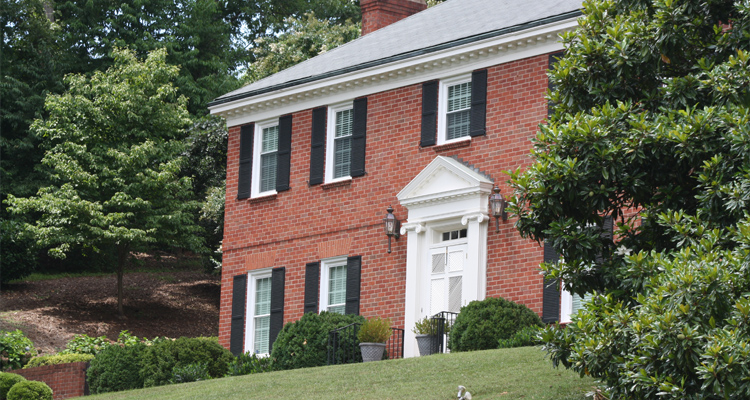To some people, the furniture in Dr. Andrew Gehrken’s home might look like pieces of dark wood.
Most pieces date to the late 18th and early 19th centuries. They were made in Eastern and Piedmont Virginia and North Carolina during a time when this land was transforming through revolution from a backwater colony of a faraway kingdom into an independent nation that would become a beacon of self-governance for the world.
These wooden echoes of America’s beginnings fill the red brick Georgian on Dan Lee Terrace in Martinsville where Gehrken lives with his wife Anna. Their home is one of three that will open to visitors on Martinsville-Henry County Garden Day, May 1.
Andy Gehrken’s antique collection became an avocation, one in which Anna Gehrken, with a background in design in the furniture and fabrics industry, joined him.
In a sense, Andy Gehrken’s avocation came from his mother. She loved antiques and often took him with her on her hunts.
Oddly enough, it was a house fire in 1987 that re-awakened his dormant interest. When contemplating replacing things lost in the fire, a friend counseled buying antiques, which would be more likely to hold or even appreciate in value.
Gehrken sought guidance from experts such as Mike Tuccori, then at the Museum of Southern Decorative Arts; and John Bivens and Wallace Gusler, experts in North Carolina and Virginia furniture, respectively.
Gehrken has spent the intervening three decades since the fire looking for treasures and refining his collection of finds. Some pieces might well be museum-worthy.
While to some, these furnishings might look like “pieces of dark wood,” in Gehrken’s words, to him each is “almost a living thing. It tells a story of its own.”
The story is, in part, that of the person who made the piece. In those days before mass production, furnishings were highly valued, hard to come by and often passed down from generation to generation. Antiques also tell the stories of their owners.
For those intrigued by such things, a piece can open a window onto another time.
And what a pivotal period of time. Gehrken gravitates to furniture made when this land was being settled. Many who risked their lives to get here left homelands with little potential for escaping the Old World’s strictures of birth and religion. For some, the then-New World offered the possibility of rising by dint of hard work and perseverance.
It was the Age of Enlightenment. The movement emphasized reason, liberty, individualism and the scientific method, which led, as Gehrken says, to the democratization of knowledge and upward mobility.
In design, the Enlightenment made its influence felt as furniture makers turned away from the opulence of often ornate styles favored by autocrats who embodied the antithesis of democracy.
The furniture Gehrken collects was influenced by the functional yet appealing “neat and plain aesthetic.” Gehrken gravitates to more formal examples of the style.
“I can’t take much credit for it,” Andy Gehrken says. He gives it up for “my decorator,” who is also their landscape maven.
Take the couple’s dining room as an example of their melded style. The walls feature a hand-painted mural by North Carolina artist Dana Holliday. Scenes depict the Blue Ridge Mountains and some of the family’s favorite places. The room’s highlights also include a Piedmont Virginia cellarette, an Orange County corner cupboard and a special set of chairs slip-covered in linen damask according to 18th-century practice.
Although the Gehrken home offers many examples of colonial and early American style, Andy Gehrken says, “It is not a house museum.”
Indeed, it marries the contemporary, such as his daughter Greer’s artwork, with the old. And Anna Gehrken’s daughter Liza’s room is furnished in Anna Gehrken’s family heirlooms rather than the couple’s collected antiques.
Andy Gehrken looks back and sees that “good things can come from bad,” such as a life-enriching appreciation for antiques revived after a house fire. In a way, it echoes the birth of the Enlightenment out of autocracy.
Fun fact: The Gehrken home is part of a three-house compound built by members of the Globman family, owners of Globman’s Department Store, once Martinsville’s shopping mecca.
411
What: Martinsville-Henry County Garden Day
When: Wednesday, May 1, 2019
Hours: 10 a.m. to 6 p.m.
Headquarters: Martinsville-Henry County Visitors Center, 191 Fayette St., Martinsville
Tickets: $15 pp./advance; $20 pp./tour day. $10 pp./children ages 6-12.
Advance tickets: va garden week. Locally at Martinsville-Henry County Visitor Center, Piedmont Arts Association, Historic Henry County Courthouse, and the Martinsville-Henry County and Patrick County Chambers of Commerce.
Tour day tickets: Martinsville-Henry County Visitor Center and tour homes.
Organizers: The Martinsville Garden Club, The Garden Study Club and the Garden Club of Virginia
